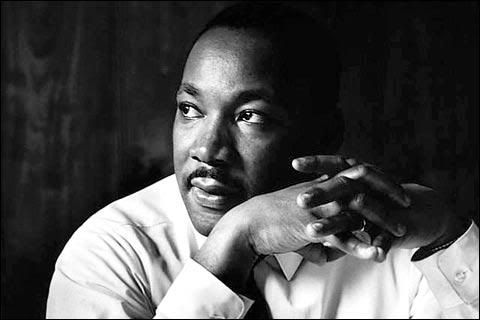
Martin Luther King Jr. combined theological exposition with sociological sensitivity.
Here's a little MLK Jr. remembrance.
In 2004 while waiting for my next flight, I found myself walking around the Atlanta airport and there -- on Concourse E -- I came on a wonderful surprise.
The "Legacy of a Dream" exhibit at Hartsfield-Jackson airport is a small, permanent display of Dr. King's life featuring glasses, baseball bat & ball, the suit MLK Jr. wore meeting Lyndon Johnson, his watch, transistor radio, and other personal items. What a find!
With wedding pictures and other mementos from history tucked into this intimate exhibit, I felt closer just being able to stand a few inches from the things that had been closest to him.
The youtube video (above) doesn't show everything in the exhibit. When you visit the exhibit yourself, you can see books from his personal library.
Among the few, open books laid out under a clear, plastic case is Dr. King's own underlined copy of Pitrim Sorokin's Social and Cultural Dynamics -- a classic work from the Russian immigrant who occupied the first Chair of Sociology at Harvard University. I'm sure most people overlook Sorokin's magnum opus. The title of this massive tome is a bit obscure. But I happen to know this book is a key text in classic sociological theory.
In King's student days, Sorokin's ideas represented one of the grandest attempts to capture the flow of history with sensitivity to the persistent structures of human society.
 Image via Wikipedia Basically, anyone who was serious about understanding human society read this masterwork by Sorokin.
Image via Wikipedia Basically, anyone who was serious about understanding human society read this masterwork by Sorokin.I knew Martin Luther King Jr. studied both sociology and theology in his preparation for ministry. The personal books on display were among the books that shaped his perspective on the world. Yet here in Atlanta's Hartsfield-Jackson airport, I could see clearly the careful, penciled markings of this one, thick book, the margins marking the sequential progression of the young man's mind being stretched in unexpected directions.
Dr. King saw no conflict in understanding the human world alongside the development of his theological sophistication. And reading his later writings, his sociological sensitivity breathes throughout his work.
Of all Dr. King's writings, my own favorite is the short, dense, and powerful Why We Can't Wait. The book includes his eloquent Letter from Birmhingham Jail. My students and I spend hours on this text. And I think it is one of the more powerful memories they take with them out into the world.




No comments:
Post a Comment